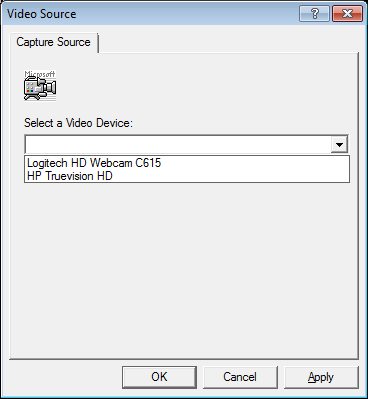OpenCV’s VideoCapture :: открыть диалог источника видео
В моем текущем проекте, когда я вызываю VideoCapture :: open (camera device index) и камера используется другой программой, она показывает Video Source и возвращает true, когда я выбираю устройство, которое уже используется.
Тем не менее, в моем [предыдущем] экспериментальном проекте, когда я вызвал VideoCapture :: open (camera device index), это не показывает этот диалог.
Я хочу знать, что вызывает Video Source диалоговое окно, чтобы показать и программа вести себя иначе, чем экспериментальный проект.
Это исходный код экспериментального проекта:
int main (int argc, char *argv[])
{
//vars
time_duration td, td1;
ptime nextFrameTimestamp, currentFrameTimestamp, initialLoopTimestamp, finalLoopTimestamp;
int delayFound = 0;
int totalDelay= 0;
// initialize capture on default source
VideoCapture capture;
std::cout << "capture.open(0): " << capture.open(0) << std::endl;
std::cout << "NOOO" << std::endl;
namedWindow("video", 1);
// set framerate to record and capture at
int framerate = 15;
// Get the properties from the camera
double width = capture.get(CV_CAP_PROP_FRAME_WIDTH);
double height = capture.get(CV_CAP_PROP_FRAME_HEIGHT);
// print camera frame size
//cout << "Camera properties\n";
//cout << "width = " << width << endl <<"height = "<< height << endl;
// Create a matrix to keep the retrieved frame
Mat frame;
// Create the video writer
VideoWriter video("capture.avi",0, framerate, cvSize((int)width,(int)height) );
// initialize initial timestamps
nextFrameTimestamp = microsec_clock::local_time();
currentFrameTimestamp = nextFrameTimestamp;
td = (currentFrameTimestamp - nextFrameTimestamp);
// start thread to begin capture and populate Mat frame
boost::thread captureThread(captureFunc, &frame, &capture);
// loop infinitely
for(bool q=true;q;)
{
if(frame.empty()){continue;}
//if(cvWaitKey( 5 ) == 'q'){ q=false; }
// wait for X microseconds until 1second/framerate time has passed after previous frame write
while(td.total_microseconds() < 1000000/framerate){
//determine current elapsed time
currentFrameTimestamp = microsec_clock::local_time();
td = (currentFrameTimestamp - nextFrameTimestamp);
if(cvWaitKey( 5 ) == 'q'){
std::cout << "B" << std::endl;
q=false;
boost::posix_time::time_duration timeout = boost::posix_time::milliseconds(0);
captureThread.timed_join(timeout);
break;
}
}
// determine time at start of write
initialLoopTimestamp = microsec_clock::local_time();
// Save frame to video
video << frame;
imshow("video", frame);
//write previous and current frame timestamp to console
cout << nextFrameTimestamp << " " << currentFrameTimestamp << " ";
// add 1second/framerate time for next loop pause
nextFrameTimestamp = nextFrameTimestamp + microsec(1000000/framerate);
// reset time_duration so while loop engages
td = (currentFrameTimestamp - nextFrameTimestamp);
//determine and print out delay in ms, should be less than 1000/FPS
//occasionally, if delay is larger than said value, correction will occur
//if delay is consistently larger than said value, then CPU is not powerful
// enough to capture/decompress/record/compress that fast.
finalLoopTimestamp = microsec_clock::local_time();
td1 = (finalLoopTimestamp - initialLoopTimestamp);
delayFound = td1.total_milliseconds();
cout << delayFound << endl;
//output will be in following format
//[TIMESTAMP OF PREVIOUS FRAME] [TIMESTAMP OF NEW FRAME] [TIME DELAY OF WRITING]
if(!q || cvWaitKey( 5 ) == 'q'){
std::cout << "C" << std::endl;
q=false;
boost::posix_time::time_duration timeout = boost::posix_time::milliseconds(0);
captureThread.timed_join(timeout);
break;
}
}
// Exit
return 0;
}

Решение
Задача ещё не решена.
Другие решения
Других решений пока нет …
